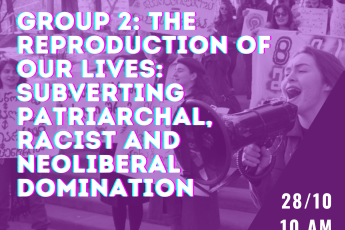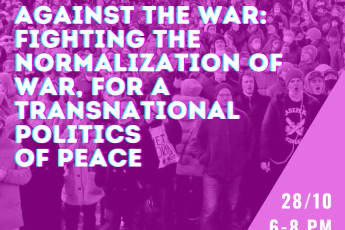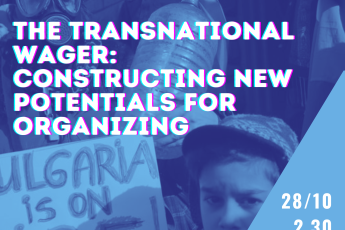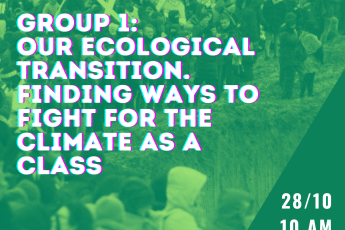FRANKFURT TRANSNATIONAL MEETING
14:00 – 16:00 INQUIRIES ON THE PRESENT PART II – WORKSHOPS 4+5
In this workshop we want to focus on struggles in social reproduction as part of a broader process of building a transnational feminist strike movement in the context of the Russian invasion in Ukraine and related processes of increasing militarization, violent economic policy, strengthening institutional racism and border control as well as a reinforcement of patriarchal violence, gender roles and repression of LGBTQI+ people. We will work on the question of how to connect moments of insubordination which seem separate and disperse into a common struggle to subvert the patriarchal, racist and exploitative conditions of social reproduction. Our discussion will be based on current struggles led by women, migrants, LBGTQI+ people, and workers pointing to the social strike. In the last year we have seen a general strike triggered by women’s anti-patriarchal revolt in Iran, echoed by Afghan women who have been protesting against their exclusion from educational institutions and employment. We have seen women in Ukraine fighting to survive and moving across the borders to escape the violence of war and seek a better and autonomous life. We have seen the mothers’ protest in Russia against the aggression on Ukraine, partial mobilization and the increase in violence against women and their reproductive labor. Together with similar strikes in Belgium, Bulgaria and Germany we have seen the strikes of the nurses in the UK for wage increase in the face of disastrous inflation rates produced by the war and intensifying workloads. We have seen women in Turkey inaugurating 2023 as a year of women’s struggle against war, male and state violence and exploitation, and Kurdish people massively taking to the streets after the attacks against them, carried on in silent complicity of all world powers. We have seen a general strike in France against the pension reform. Forming connections between these experiences of a social strike is urgent in the current divisive context: the pandemic and, especially, the Russian invasion of Ukraine have compressed the space for political initiatives. By exacerbating violence against women, increasing reproductive workload and coercion to work, precarity, racism and restrictive border politics, they have made a global rejection of patriarchal violence, racism and disruption of production and social reproduction more difficult. Despite these challenges, strikes are happening. What lessons can we take from these struggles to build and strengthen the transnational feminist movement, to revive the spirit of the feminist strike?
During the workshop we will begin our collective reflection with interventions from activists involved with the Iranian protests and Kurdish women’s movement, the Russian Feminist antiwar resistance, the hospital worker’s strike in Germany and further participants. We ask them and all the participants to contribute to and collectively work on these questions:
– Building power and organizing as ‘essential workers’ in times of war: Essential workers, mostly women and migrants, are striking against exploitation and for better wages, in a context in which the war, through inflation, rising energy and food costs, coercion to work, is worsening the general working and living conditions. How can we foster the connections between essential workers’ strike and a transnational movement for peace that fights against the effects of the war?
– Elaborating old and new strategies for the feminist strike as social strike: What different tools emerged in the various contexts of our struggles out of the basic idea of the feminist strike, which aimed at disrupting production and social reproduction, by connecting struggles in the workplace with the social and political conditions of exploitation and oppression? How can we connect our tools and local struggles to develop new strategies and a powerful mobilization on March 8th?
– Overcoming divisions and fragmentation: How can we work on fault lines that are emerging from the row of current crises, especially the war? How can we engage with and support different local feminist struggles as part of the wider upcoming transnational mobilization towards the 8th of March?
Location: Festsaal





